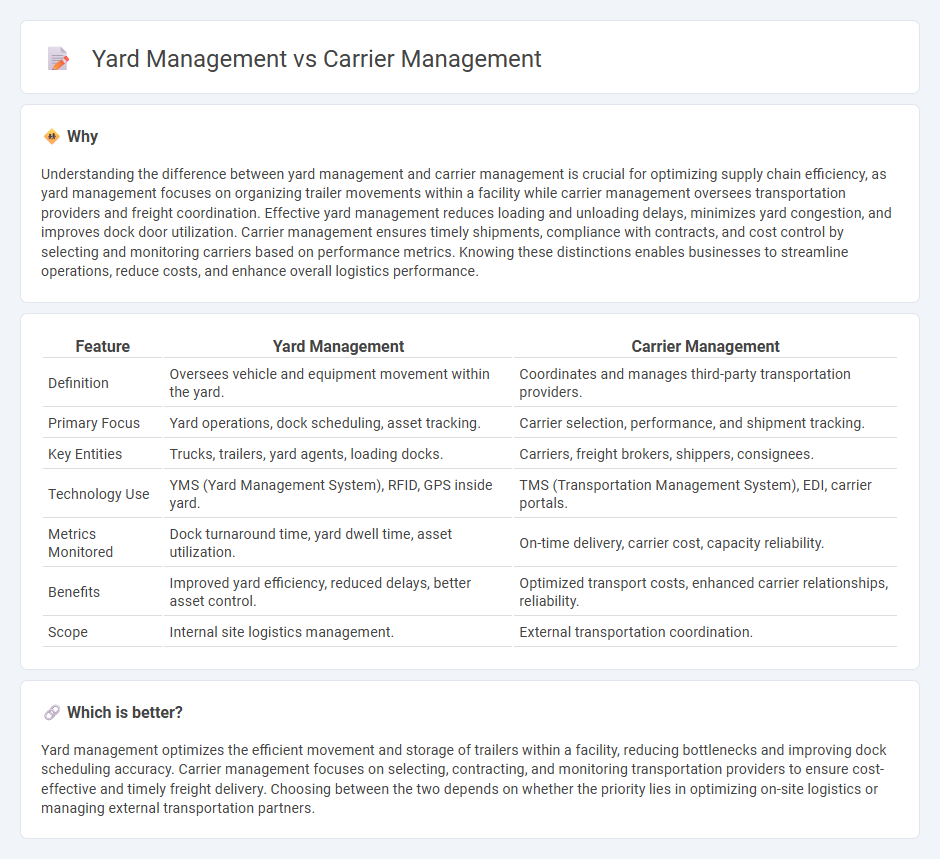
Yard management focuses on optimizing the movement and storage of trailers within a facility, ensuring efficient dock scheduling, space utilization, and minimizing wait times. Carrier management involves coordinating with transportation providers to streamline freight dispatch, tracking shipments, and managing carrier performance for timely deliveries. Explore the differences and benefits of each to enhance your supply chain operations.
Why it is important
Understanding the difference between yard management and carrier management is crucial for optimizing supply chain efficiency, as yard management focuses on organizing trailer movements within a facility while carrier management oversees transportation providers and freight coordination. Effective yard management reduces loading and unloading delays, minimizes yard congestion, and improves dock door utilization. Carrier management ensures timely shipments, compliance with contracts, and cost control by selecting and monitoring carriers based on performance metrics. Knowing these distinctions enables businesses to streamline operations, reduce costs, and enhance overall logistics performance.
Comparison Table
| Feature | Yard Management | Carrier Management |
|---|---|---|
| Definition | Oversees vehicle and equipment movement within the yard. | Coordinates and manages third-party transportation providers. |
| Primary Focus | Yard operations, dock scheduling, asset tracking. | Carrier selection, performance, and shipment tracking. |
| Key Entities | Trucks, trailers, yard agents, loading docks. | Carriers, freight brokers, shippers, consignees. |
| Technology Use | YMS (Yard Management System), RFID, GPS inside yard. | TMS (Transportation Management System), EDI, carrier portals. |
| Metrics Monitored | Dock turnaround time, yard dwell time, asset utilization. | On-time delivery, carrier cost, capacity reliability. |
| Benefits | Improved yard efficiency, reduced delays, better asset control. | Optimized transport costs, enhanced carrier relationships, reliability. |
| Scope | Internal site logistics management. | External transportation coordination. |
Which is better?
Yard management optimizes the efficient movement and storage of trailers within a facility, reducing bottlenecks and improving dock scheduling accuracy. Carrier management focuses on selecting, contracting, and monitoring transportation providers to ensure cost-effective and timely freight delivery. Choosing between the two depends on whether the priority lies in optimizing on-site logistics or managing external transportation partners.
Connection
Yard management and carrier management are interconnected through the coordination of inbound and outbound shipments to optimize loading dock efficiency and minimize wait times. Effective yard management provides real-time visibility of trailer locations and statuses, enabling carrier management to schedule arrivals and departures more accurately. This integration reduces bottlenecks, enhances resource utilization, and improves overall supply chain reliability.
Key Terms
**Carrier Management:**
Carrier management involves optimizing relationships with transportation providers to enhance freight efficiency, reduce costs, and improve delivery reliability. Key aspects include carrier selection, performance tracking, contract negotiation, and maintaining compliance with industry regulations. Discover how advanced carrier management solutions can revolutionize your supply chain operations.
Freight Procurement
Carrier management concentrates on optimizing relationships and contracts with transportation providers to secure cost-effective and reliable freight services. Yard management focuses on coordinating the movement and storage of trailers within the facility to streamline loading, unloading, and dispatch processes. Explore how integrated carrier and yard management enhances freight procurement efficiency.
Carrier Performance
Carrier management centers on tracking key performance indicators such as on-time deliveries, freight cost efficiency, and carrier compliance to optimize transportation operations. Yard management emphasizes efficient trailer movement, dock scheduling, and yard capacity utilization to minimize delays and enhance overall supply chain fluidity. Explore how integrated solutions can elevate carrier performance and streamline yard activities for superior logistics outcomes.
Source and External Links
What is Carrier Management? Key to Optimizing Logistics & Costs - Carrier management involves selecting, contracting, and managing carriers to ensure reliable, efficient transportation, including evaluating carriers based on service, cost, and compliance, and formalizing contracts with performance metrics and negotiation.
Carrier Management Software - Manhattan Associates - Carrier management software optimizes load assignments, reduces operational costs, manages driver hours, and improves carrier network balance and profitability with tools like route optimization, load matching, and profitability analysis.
Motor Carrier Management Information System | FMCSA - The FMCSA Motor Carrier Management Information System allows motor carrier companies to electronically access driver inspection and crash records and comply with annual drug and alcohol testing reporting requirements.
 dowidth.com
dowidth.com